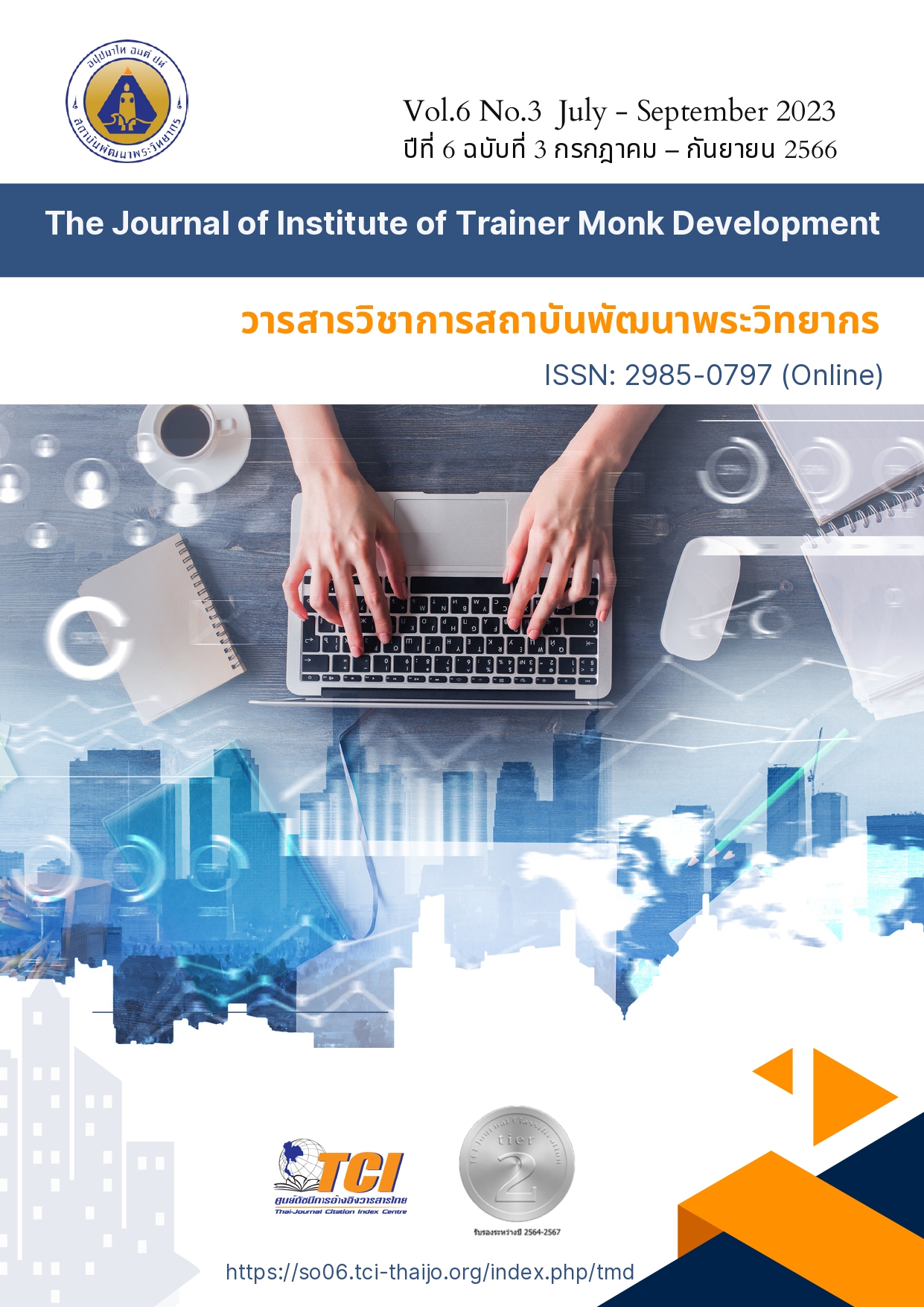Effects of Organizing Mathematics Learning Activity Using Scaffolding Approach on Mathematical Problem Solving Ability of Fifth Grade Students
Main Article Content
Abstract
This Article aimed to study 1) to compare the learning achievement in the mathematics on fraction problem of fifth grade students by using scaffolding approach with criteria 70 percent 2) to compare mathematical problem solving ability on fraction problem of fifth grade students between before and after taught by using scaffolding approach. The sample group is the 42 fifth grade students, semester 1, academic year 2022, Watphrapathomchedi School, Nakornpathom by purposive sampling. The instrument of this research consisted of 1) the mathematics lesson plan on fraction problem by using scaffolding approach for fifth grade students. 2) the mathematics achievement test on fraction problem of fifth grade students and 3) the mathematical problem solving ability test on fraction problem of fifth grade students. The statistics in the analysis were percentage, mean, standard deviation, and t-test. The research results were found as follows; 1) post-learning achievement on fraction problem of fifth grade students by using scaffolding approach was higher than the criteria 70 percent or 7 points of total 10 points at statistical significance level of .05 2) the student who learned by using scaffolding approach had mathematical problem solving ability on fraction problem higher than before learning at statistical significance level of .05
Article Details

This work is licensed under a Creative Commons Attribution-NonCommercial-NoDerivatives 4.0 International License.
บทความที่ได้รับการตีพิมพ์เป็นลิขสิทธิ์ของวารสารวิชาการสถาบันพัฒนาพระวิทยากร
ข้อความที่ปรากฎอยู่ในบทความที่ได้รับการตีพิมพ์ในวารสาร ถือเป็นความรับผิดชอบของผู้เขียนบทความ และข้อคิดเห็นนั้นไม่ถือว่าเป็นทัศนะและความรับผิดชอบของกองบรรณาธิการวารสารวิชาการสถาบันพัฒนาพระวิทยากร
References
กุลนิดา ปลื้มปิติวิริยะเวช. (2559). การพัฒนากระบวนการเรียนการสอนตามแนวคิดการสร้างแบบจำลองทางคณิตศาสตร์และแนวคิดการเสริมต่อการเรียนรู้ เพื่อส่งเสริมความสามารถในการแก้ปัญหาและการใช้ตัวแทนทางคณิตศาสตร์ ของนักเรียนระดับชั้นมัธยมศึกษาตอนต้น วิทยานิพนธ์ปริญญาดุษฎีบัณฑิต. จุฬาลงกรณ์มหาวิทยาลัย.
มยุรา กล่อมเจริญ. (2559). การใช้กิจกรรมการเขียนเชิงสร้างสรรค์ด้วยวิธีสแกฟโฟลด์เพื่อพัฒนาการเขียนเชิงสร้างสรรค์ของนักเรียนระดับชั้นประถมศึกษาปีที่ 6 ในเขตกรุงเทพมหานคร.วิทยานิพนธ์ปริญญามหาบัณฑิต. จุฬาลงกรณ์มหาวิทยาลัย.
ล้วน สายยศ และอังคณา สายยศ. (2540). สถิติวิทยาทางการวิจัย. (พิมพ์ครั้งที่ 3). กรุงเทพฯ: สุวีริยาสาส์น.
ศรันยา ภูสง่า และคณะ. (2561). ระดับยุทธวิธีการเสริมต่อการเรียนรู้ในชั้นเรียนคณิตศาสตร์ที่ใช้การศึกษาชั้นเรียนและวิธีการแบบเปิด. วารสารศึกษาศาสตร์ ฉบับวิจัยบัณฑิตศึกษา มหาวิทยาลัยขอนแก่น, 12(2): 84-94.
สถาบันทดสอบทางการศึกษาแห่งชาติ. (2562). รายงานผล O-NET ด้วยแผนที่ประเทศไทย. สืบค้นเมื่อ 20 เมษายน 2565 จาก https://www.niets.or.th/th/catalog/view/3121
สำนักงานคณะกรรมการพัฒนาการเศรษฐกิจและสังคมแห่งชาติ. (2562). ยุทธศาสตร์ชาติ พ.ศ. 2561-2580. (พิมพ์ครั้งที่ 2). สำนักงานเลขานุการของคณะกรรมการยุทธศาสตร์ชาติ.
Anghileri, J. (2006). Scaffolding practices that enhance mathematics learning. Journal of Mathematics Teacher Education, (9)(1): 33-52.
Ismail, N., et al. (2019). The Effect of Maternal Scaffolding on Problem Solving Skills during Early Childhood. The Journal of Behavioral Science, (14)(3): 76-89.
Vygotsky, L. S. (1978). Mind in society: The Development of higher psychological processes. Harvard University Press.
Wood, D., et al. (1976). The role of tutoring in problem solving. Journal of Child Psychology and Psychiatry, (17)(2): 89-100.


